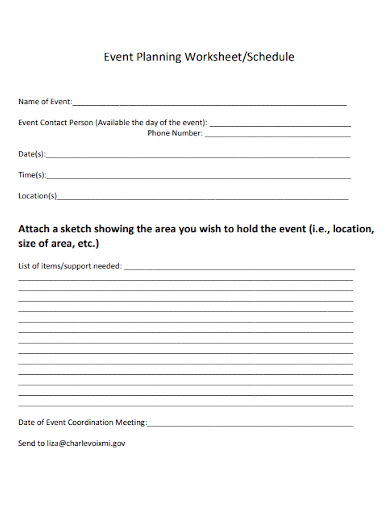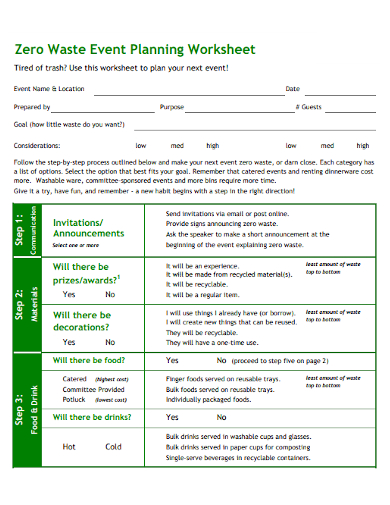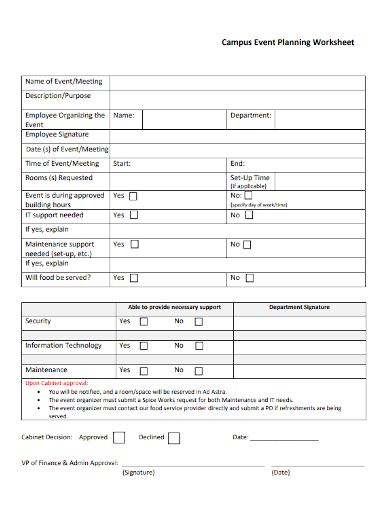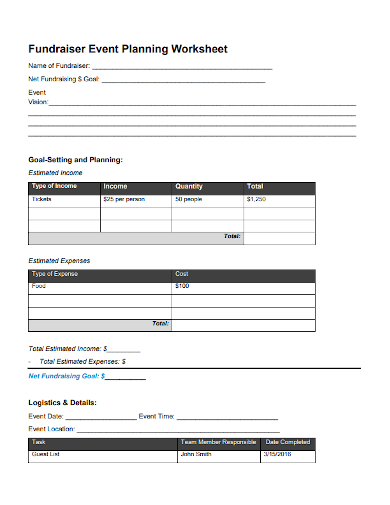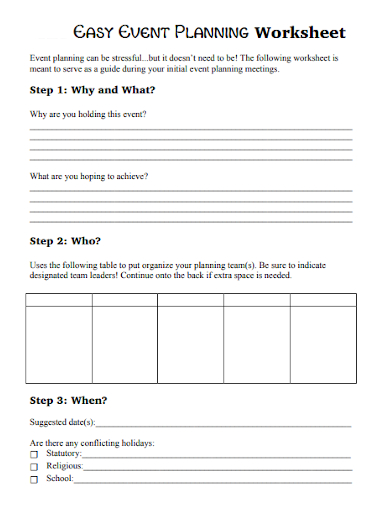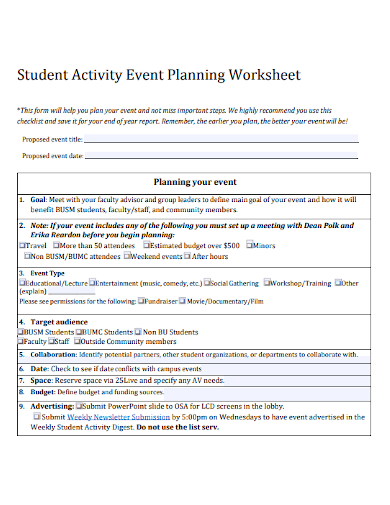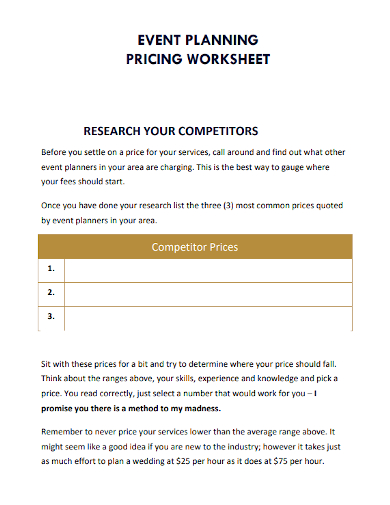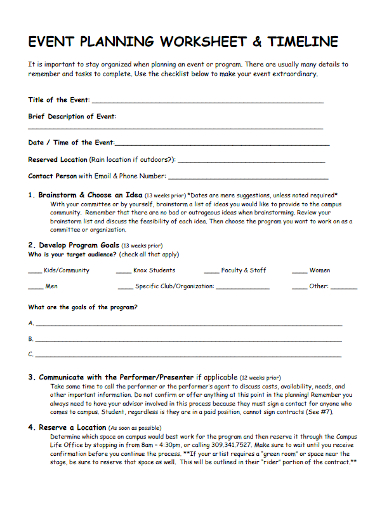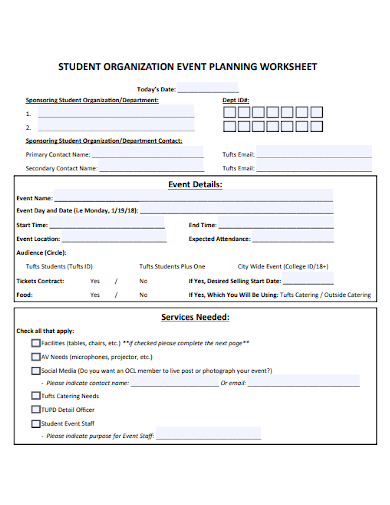Whether you’re organizing a large conference or music festival, it’s no secret that event planning is a humongous task that doesn’t end until the day of the event arrives. Sometimes, event planning can even extend after the event is done. It’s no joke planning an event. If you want it to be successful and avoid the event from flopping every event requires detailed planning and organization. From establishing an adequate budget for the event to promoting it, you need to plan every aspect of the event carefully. Every event has varying goals, audiences, and budge to name a few, an event planner is essential to ensure that your goals are met, your budget is perfect for the event, and you attract your target audience successfully. This article will guide you on how to plan an event and provide you with some worksheets for you to use in organizing your planning process.
10+ Event Planning Worksheet Samples
1. Event Planning Worksheet Template
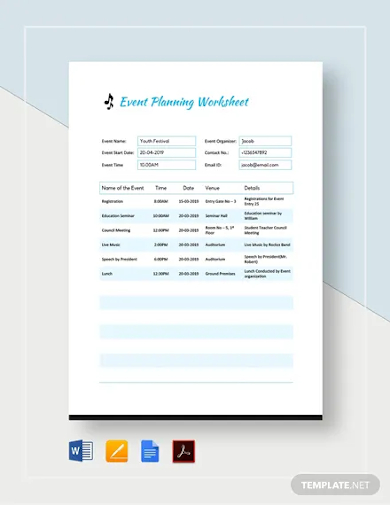
2. Event Planning Budget Worksheet Template
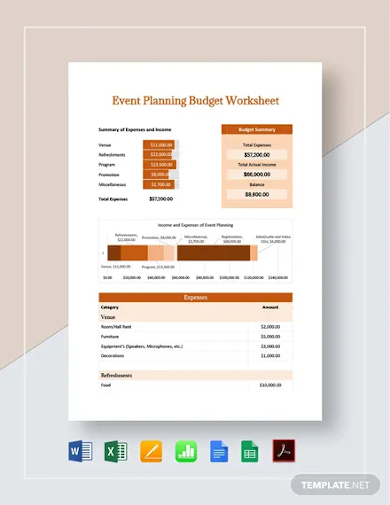
3. Event Planning Worksheet and Schedule
4. Zero Waste Event Planning Worksheet
5. Campus Event Planning Worksheet
6. Fundraiser Event Planning Worksheet
7. Easy Event Planning Worksheet
8. Student Activity Event Planning Worksheet
9. Event Planning Pricing Worksheet
10. Event Planning Worksheet & Timeline
11. Student Organization Event Planning Worksheet
What is Event Planning?
Event planning is the process of organizing activities that surround an event. The event could be any social gathering events such as parties, festivals, conferences, or tradeshows, just to name a few. Event planners work on every aspect of the event; from catering services to entertainment, booking presenters, and hiring staff to do various responsibilities. The goal of event planning is to ensure every area of the event is covered and will be fulfilled on time while staying on the set budget.
How to Plan for an Event
1. Define the Event’s Objectives
Before you worry about the details regarding the event, the first thing to do is to determine what you hope to achieve from the event. What you want to achieve, are your objectives. Make sure your objectives are realistic and relevant to the event so you can produce a great event.
2. Choose the Venue
Now is the time to scout for the perfect venue for your event. Make sure that the venue is adequate for your event before you book it. Don’t forget to ask the in-charge of the venue regarding the costs in booking the location and other important details such as parking, transportation to and from the venue, and food and beverage services.
3. Set a Date
Another important aspect to also prepare for your event is the date. Create a date that is suitable for your intended audience and the presenters or entertainers involved in the event. Make sure it doesn’t conflict with other important events or holidays.
4. Create a Plan
Create a plan where you can list down all the activities you will need to do to prepare for the event, the timeline on which activities should be completed, and the resources you need to help you complete the event. A plan will help you organize and prioritize all the things you need to do for the event.
5. Making and Delivering Invitations
Don’t forget to create invitations to let people know your event is happening. Make sure you include all the necessary details such as the date and time of the event, the location of the venue, RSVP details, and any additional information that the attendees may need to know. Strategize on when you will send out the invitations. If you send it too early, your attendees may forget about and if you send it out too late, your attendees may have other commitments and they won’t be able to attend your event.
6. Last Minute Preparation on the Day of the Event
On the day of the event, you have to do some last preparations to make sure that everything is in order. Welcome any special guests make them feel at ease in their tasks for the event. Have your running order prepared in advance and ensure your staff knows each of their responsibility to ensure the event is a success.
FAQs
What are the key components of event planning?
The key components of event planning are:
- Event preparation: This involves writing an event plan, documenting the budget needed for the event, timeline to prepare for the event, and looking for suppliers like caterers or staff members to help organize the event.
- Event promotion: This involves marketing and raising awareness of the event to increase the number of attendees.
- On-site event management: This involves making sure that the day of the event goes without a hitch and that everyone is where they need to be and knows what they need to do.
- Post-event review: This involves collecting and organizing event attendees’ feedback, data collection and analysis, and comparing the data against the original event aims and figures.
What elements to include in an event safety plan?
The elements to include in the event safety plan are:
- Reducing any risks from happening by providing a health and safety plan to staff
- Organizing health and safety team to regulate the health and safety policies for attendees
- Providing first aid, toilets, and wash facilities for everyone to use especially in case of emergencies
- Providing adequate parking spaces for all staff and attendees
- Organizing waste removal
- Ensuring food safety is observed
Once the event is over, congratulate yourself on a job well done. Now is the time to do your post-event evaluation. Take the time to reflect on all the things that happened during the preparation process up until the day of the event. Determine your strong points and determine what areas you need to improve on. Does your time management need to be improved? Do you need to improve on assigning tasks to maximize your efficiency? Don’t forget to note your evaluation and reflection so you can apply your learnings in the future when you organize events. To help you get started making the event planning worksheet, download our free sample templates above to use as your guide!
Related Posts
FREE 24+ Progress Worksheet Samples in PDF | MS Word
FREE 30+ Development Worksheet Samples in PDF | MS Word
FREE 33+ Course Worksheet Samples in PDF | MS Word
FREE 16+ Verification Worksheet Samples in PDF | MS Word
FREE 14+ Feedback Worksheet Samples in PDF | MS Word
FREE 50+ Assessment Worksheet Samples in PDF | MS Word
FREE 25+ Campaign Worksheet Samples in PDF
FREE 50+ Application Worksheet Samples in PDF | MS Word
FREE 10+ Distribution Worksheet Samples in PDF
FREE 10+ Family Worksheet Samples in PDF
FREE 10+ Personal Worksheet Samples in PDF
FREE 7+ Depreciation Worksheet Samples & Templates in PDF | MS Word
FREE 10+ Typing Worksheets Samples in PDF | DOC
FREE 10+ Maths Worksheets Samples in PDF | DOC
FREE 10+ 4th grade Worksheets Samples in PDF

